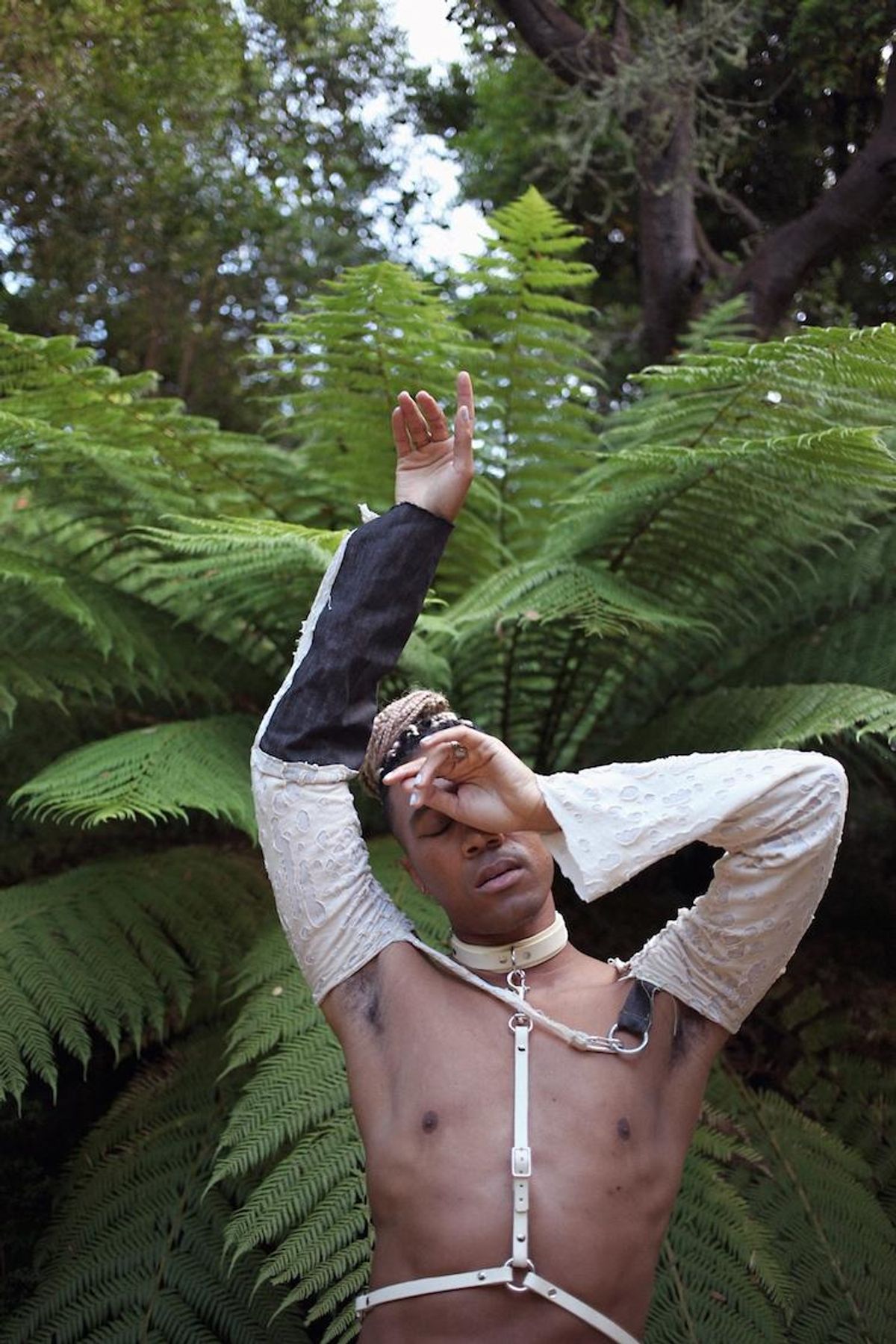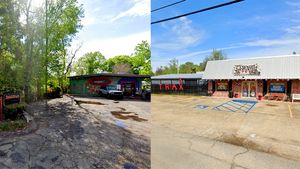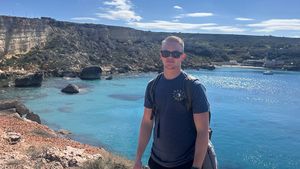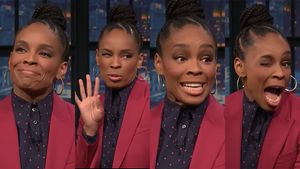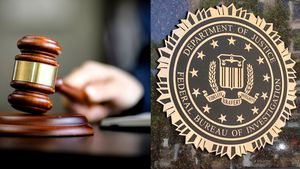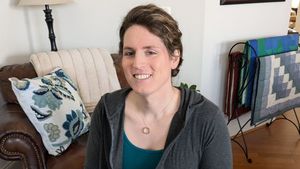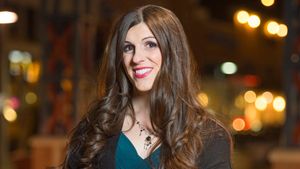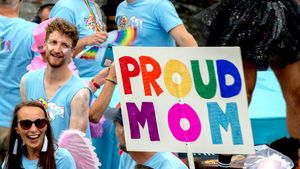Saturn Rising's darkest dream is to fully understand himself and be understood by others--something the Bay Area musician edged closer to by creating his debut EP,Darkest Dream. The five-track project, released this summer through Molly House Records, juxtaposes Saturn's oppressive Catholic background and liberating journey through go-go dancing in San Francisco clubs. Each track aggressively wrestles between both lived experiences, highlighting his difficult quest for love as a sexually guarded queer.
Related | Premiere: Saturn Rising Explores Queer Fear & Self-Acceptance on Darkest Dream
Sonically, the breakout EP reflects this moody attitude and subject-matter, lacing existential lyrics like "I take too much time to get my life" above sludgy, tribal-trap electronica. Saturn cites dark-pop albums like Britney Spears' 2007 LP, Blackout, as ongoing inspiration, and it's heard in the way he bridges '90s R&B melodies with contrasting underground club production. He's as interested in making you dance as he is he yearning to invite you into his beautiful, twisted headspace.
Listen to Saturn Rising's Darkest Dream, and learn more about the rising California artist, below.
OUT: Where are you from originally?
Saturn Rising: I'm from the Bay--this small place called Hercules that's a predominately Brown, suburban town, which is really rare and cool. I grew up there and it was really boring, so I'd always skip school to go to San Francisco and meet all these weird guys who worked at Bloomingdales. They'd take me parties, so I really got into the party scene in that area.
Were you involved in a big queer scene growing up?
It was kind of like a basic gay story, where I was friends with every girl. I didn't really have other queer people that I was friends with. I got into a dance team when I was 16 and that's when I met other gay boys, but they were a little too messy for me at the time [Laughs]. I wasn't about that, I was a strong Christian boy. As I got older and started going to parties, I started meeting San Francisco's queer scene. It was all these free people. Everyone was super happy and about being the best version of themselves. That's when I was like, These are my people--this is my vibe.
What's the story behind your name, Saturn Rising?
I went to this party and was too young. I heard the name, Saturn, being used, so I was like, That's what I'm going to say. My friends and I came up with fake names. I was Saturn, and everyone I told it to was like, That's so dope. That weekend, the VMAs were on and there was a Saturn car commercial that was about rethinking everything. My friend was like, That's you--you're rethinking everything. I googled songs written about Saturn, and Steve Wonder has one about rethinking everything and being your own person. This theme kept bringing itself to me, and the work I do is about being fully myself physically and spiritually.

How did you performance background segue into music?
My performance background was a way to get into music. I was too afraid to go after my dreams in the fullest way back when I started performing, so the minute I got a gig as a go-go dancer, I was like, I'm going to do this. I knew that I'd meet people and I knew that I'd be seen, because most go-go dancers don't dance--they two-step in underwear. I was a full-on dancer, so I was really giving shows and created buzz in San Francisco.
What were you first major steps into music-making?
I started hitting people up for beats, but that didn't really work, so I became a backup dancer for this group Double Duchess. Davo Makes Beats, who is the co-owner of my label Molly House, started to work with me on music. He trusted me and that led to other people trusting me, and now I'm working with seven different producers on my next project. It's cool that I took go-go dancing as a way to to here, and now I'm here.
What life experiences do you outline through Darkest Dream?
"Darkest Dream" is how the album starts, and it's about me being in a moment with this boy where I'm like, I could be the one for you, but I'm not going to tell you. I want to keep my distance. Then it goes into "Ghost," where I'm berating myself for being that way. Like, Bitch, how do you want love if you're going to let all these ghosts of your past haunt you? On "FUKWITME," I'm this party girl and I know that's who you want to be with, but I'm not giving you any of this--just fuck me and that's it. Then there's a song, called "2night))))," where I'm an obsessive one-nighter, and on the final song, "Blown," I realize I have to take steps to let this boy know I want to date him.

Do you feel like you have a different understanding of yourself after writing these songs?
Absolutely. I'm a different girl now. I've changed. I communicate. I tell guys I like them. I tell them I want to fuck them. I think writing these songs and seeing them grow has helped me grow. It's almost like Charmed--once you write spells, you become a stronger witch.
Let's discuss your relationship with sexuality. You have a background in go-go dancing, but also have issues communicating--that's an interesting disconnect.
I grew up having a lot of sexual experiences that weren't verbal--that didn't have any conversation around them, so I think the idea of performing my sexuality was really easy for me. When I'm on stage, I can be that girl. But when you want to get to know me, talk to me and tell me I'm handsome or pretty, that's just a lot more energy because it's not natural to me. Talking about myself and being upfront is unnatural, and I think that's what's led to me to my art. It's much easier for me to perform sexuality, than experience it.
Why do you think that is?
I grew up Christian, so there's a lot of shame around any sort of love for yourself and for your body. For me to have that was really scary, and it was my biggest rebellion. Like, I'm just gonna to go out here and be in my underwear and everyone's gonna gag, and they did.

Darkest Dream has a very dark, dense sound. Was this intentional?
I was always into Depeche Mode and a lot of Dark Wave, New Wave stuff. When I was in high school especially, I would always look for the darkest song on every album--the ones that were the most emotional or had the darkest beats. That was my goal, for sure. With this project, I wanted to work with people who could allow me to sing pop melodies on dark beats. I really wanted that contrast. Britney Spears' album, Blackout, will forever be my reference.
What do you hope to contribute to the queer community through Darkest Dream?
I hope to contribute a performer girl. I put on a full production at my shows--the queer pop star is something the kids get to see. It's not interesting anymore when pop stars are produced by gay people, but they're not gay--they have gay writers, gay stylists, gay everyone. They don't have the depth we have. My live shows are like if a pop girl was trained in dance, but loves a sickening look, like some assess chaps, and wants to sing tea about her innermost demons. It's full liberation and joy, but there's also depth.
Photography: Olivia Krause
Styling: Gallery Y2K
